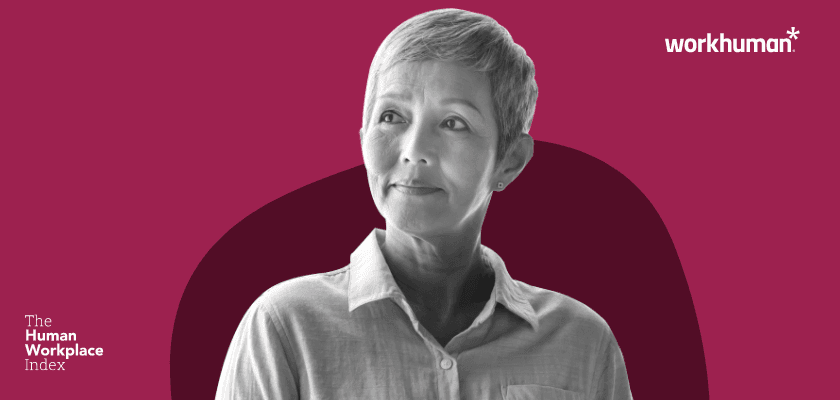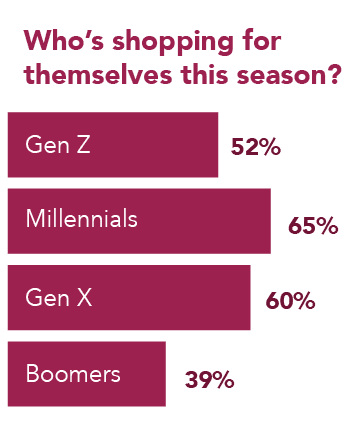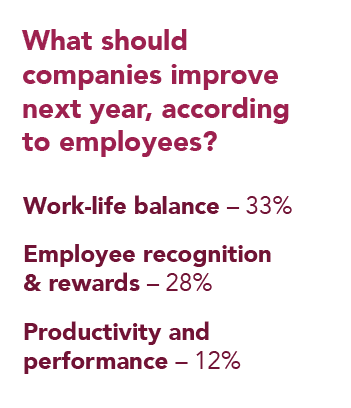Holiday Survival Guide: Employees Balance Shopping, Stress, and Success

As we pass the midpoint of the fourth quarter, employees have many things on their minds: end-of-year goals, resolutions for the new year, personal plans, and holiday vacations. It can be both an exciting and a stressful time of year in the office. To get a sense of employee behavior, wellbeing, and outlook at the end of the year, Workhuman® conducted a survey of 3,000 full-time employees across the US, UK, and Ireland.
The results found that the holidays can be a difficult time of year for employees with financial and professional strain on their minds. However, the data also revealed actionable steps leaders can take to help support their workforce to ensure a successful and rewarding end-of-year for all.
’Tis the season for spending
Last quarter, we surveyed employees on their productivity habits and found that when employees “faked productivity,” they did so for a better work-life balance. This can mean employees are balancing workloads with more personal responsibilities and errands— and around the holiday season, these may include holiday shopping.
According to our survey, 30% of global respondents started holiday shopping by the end of October, with another 30% waiting for Black Friday and Cyber Monday deals. Many employees are taking a “treat yourself” mentality when it comes to spending this season with 59% of respondents on the lookout to shop for themselves. This trend was most common among millennial workers.

Does holiday shopping translate to the workplace? While the vast majority only plan to buy gifts for their immediate family members, 1 in 4 respondents said colleagues and peers are on their shopping list, too.
Holiday shopping for coworkers is most common in the UK, with 28% of respondents saying their peers make the list. This is least common in Ireland, with only 20% of respondents saying they shop for coworkers. Despite this, Irish employees are most likely to expect gifts from colleagues, at 51% compared to the 46% global average.
Wrapped up in holiday presents may be an element of trepidation: 1 in 4 respondents believe that gifts from colleagues or managers would be related to performance. This belief is vastly more prevalent in Ireland, with 37% of respondents linking gift-giving in the office to performance.
“The end of the year is absolutely the busiest time of year for Workhuman’s ecommerce platform. When employees have the option to use their hard-earned recognition points to shop for their kids, book holiday travel, or buy something for themselves amid an especially hectic time of year, it puts gratitude at the forefront, and connects the effort you put in at work to really special moments in your personal life—not to mention alleviate some holiday-related stress.” - Eliza Goehry, VP, Global Merchandising, Workhuman
With an expanding shopping list, financial concerns can be a hallmark of the season. Many rely on their year-end bonus to support their holiday-related expenses, with 35% of employees saying it will go towards gifts or travel. Luckily, 30% will be able to spend it on something they want, but with another 17% putting the funds towards bills and expenses, the bonus is far from the “something extra” it once was.
When employees don’t have the flexibility to spend their bonus how they want to, it can cause some ill will. Employee recognition programs can be a great way to ensure that employees buy something for themselves or have the chance to get a special gift for a loved one without cutting into what they consider a vital part of their annual compensation.

Most employees (78%) would use an employee recognition/reward program to purchase holiday gifts, and the same percentage (78%) say that being able to use points for holiday shopping would alleviate spending pressure during the holiday season.
It’s (not always) the most wonderful time of the year
While December is filled to the brim with holiday spirit at home, some employees don’t see that festivity reflected at work. Thirty-three percent of global employees—1 in every 3 respondents—say that the holiday season makes them feel more stressed.

Further, when asked to select all stressors that apply to them during this time of year, 64% cited the financial burden of the holiday season as a core stressor while 33% reported an increasing workload, and another 29% said that meeting their KPIs and end-of-year goals had their cortisol pumping.
Also of note, 31% of stressed-out employees reported that the holiday season was difficult for them for personal reasons, serving as a reminder that no matter the end of year goals or pressure in play, it’s important to remember the whole human is there.
“It’s important to make sure employees feel appreciated and supported during the holiday season. Whether it’s work-related stressors or something personal going on in the life of an employee that makes this time extra difficult, leaders need to make a concerted effort to celebrate what makes those people such valuable contributors to their organization. Setting the tone of recognition can make all the difference in company culture, as well as in employees’ lives.” - Traci Pesch, Practice Lead and Strategist, Workhuman
For some, holiday time off will be a boon, with 43% of all employees saying they’ll return to work refreshed after the holidays, ready to kick off 2025. For US employees, however, there is less optimism with only 35% agreeing they’ll return refreshed after the holidays.
Others won’t be able to leave work behind so easily. Thirty-two percent of employees reporting they’ll respond to work emails over the holidays and another 20% saying they can’t take as much time off as they would like due to their large workload.
A significant group of employees must also contend with stigma: 15% of employees report that their team or management looks down on them for taking time off during the holidays. When asked to select all the reasons they feel this way, the majority said it’s too busy leading up to the end of the year (55%) and others saying it’s taken as a sign of “low commitment” (42%) or simply not within the company norm (36%).
Despite this, employees seem determined to prioritize their wellbeing. More than a third (36%) of respondents say that their wellbeing at work has improved since last year. To improve wellbeing even more, employees are ready to be more productive (37%), learn a new skill (36%), be more social with colleagues (32%), take more PTO (28%), or ask for a raise or promotion (28%).
Expectations are also on employers to help bolster wellbeing. When asked to select they ways organizations could support their wellbeing, besides compensation and salary boosts, employees selected offering better benefits (45%), more recognition (36%), and more flexibility (32%).
Survey data revealed that Gen Z’s relationship with wellbeing may be worse than their colleagues in other generations. While Gen Z has developed a reputation for caring more about wellness, wellbeing benefits, and mental health, the findings flagged their desire has not been made a widespread reality:
| Statement | Gen Z's Average | Overall Average |
|---|---|---|
| "I will not be able to full switch off from work over the holidays." | 30% | 23% |
| "I will return to work refreshed after the holidays." | 38% | 43% |
| "The majority of my coworkers also take time off during the holiday season." | 26% | 32% |
| "Pressure picks up at the end of the year." | 42% | 36% |
Leadership needs to be cognizant of what wellbeing behaviors they are—or are not—encouraging. Luckily, Gen Z is making clear what behaviors can help. They more likely than the average employee to say that public appreciation would reduce potential stress, with 69% saying it would help, compared to the overall 63%, making recognition more vital than ever.
Employees wrap up the year with the gift of gratitude
Across demographics, employees are feeling the spirit of the season, with many registering a marked change in a company’s culture at the end of the year:
- 39% report more gratitude and comradery in the workplace at the end of the year
- 34% say the company schedules more events and team outings
- 25% say there’s an increased emphasis on charity and giving back
- 20% say there’s excitement due to annual reviews.
Employees are powering this shift. Individuals taking on an attitude of gratitude as evidenced by 57% of employees saying that at the end of the year, they make a point to thank their colleagues. The package that “thank you” comes in differs for employees. When asked to check all mediums they gave recognition, with the majority (71%) saying they choose to voice their gratitude in-person, 50% show it with a physical gift, and 39% send thanks via email.
Only 37% do so through a formal employee recognition program. 65% of respondents say that the program makes it feel or would make it feel more natural to say thank you, as well as make them more likely to voice their gratitude. Recognition ranked as one of the top areas companies should improve in 2025:

Recognition ultimately hits the right notes at the end of the year. Receiving public appreciation from colleagues reduces potential stress around meeting year-end goals (63%). An essential note considering that the top answer when asked how productivity is impacted by the holiday season was that at the end of the year pressure picks up, and it makes meeting goals more intense.
The holiday season impacts employees both professionally and personally. From navigating financial strain and workplace dynamics during the busiest shopping season to balancing stressors like year-end goals and personal challenges, this time of year requires thoughtful leadership. By embracing employee recognition, fostering wellbeing, and promoting gratitude, organizations can help their teams finish the year strong and step into 2025 with renewed energy and optimism.